Paris IV
Tuesday Laurie and I headed north to Paris for a few days. Our nephew Brian and his wife Jennifer (I guess that makes her our “niece-in-law;” is there such a word?) arrived in Paris that day for their first visit and we were really looking forward to seeing them and doing some Paris stuff with them. We ended up staying until Saturday and we had a great time, when we did stuff with Brian and Jenn and when we did some stuff on our own.
The first day we just did a walk around the two islands of Paris - Ile de la Cité and Ile St. Louis. I was able to bore them by telling stories about lots of stuff. But, hey, I did it for a reason: they had flown from Seattle and were a little jet-lagged, and they were able to catch a number of cat-naps while I told my stories.
Anyway, next day we went to Musée Pompidou with its amazing collection of modern art. Now, I have to say that I am not a connoisseur of modern art, so I wasn’t too sure about this expedition. But several friends had recommended that we visit the Pompidou, and I’m glad we did. There is a Roy Lichtenstein exposition there, and that was fabulous. The rest of the museum has works I liked and works I could only respond to with “Huh?”
We did some other fun stuff.
The next day we took a walk of Montmartre - probably the most well-known area of Paris. We took a walk (from the excellent book, “Walking Paris : Thirty Original Walks In and Around Paris,” by Gilles Desmons) that started at the back side of Montmartre and wandered around the most interesting areas. The street below is Villa Leandre, a row of private houses; I cannot imagine what these houses are worth, in this city of apartments.
And we were not the only ones enjoying a beautiful day.
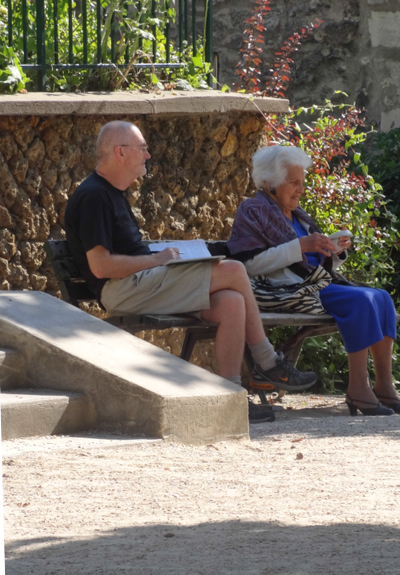
But of course, the walk eventually had to go into the areas best known by the tourists, just because…because…ummmm…well, I don’t know why. We saw lots of beautiful areas on the walk and then…
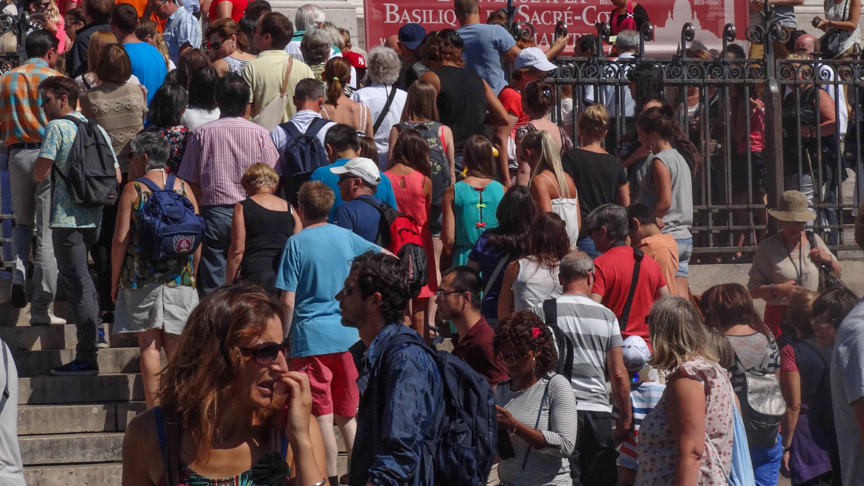
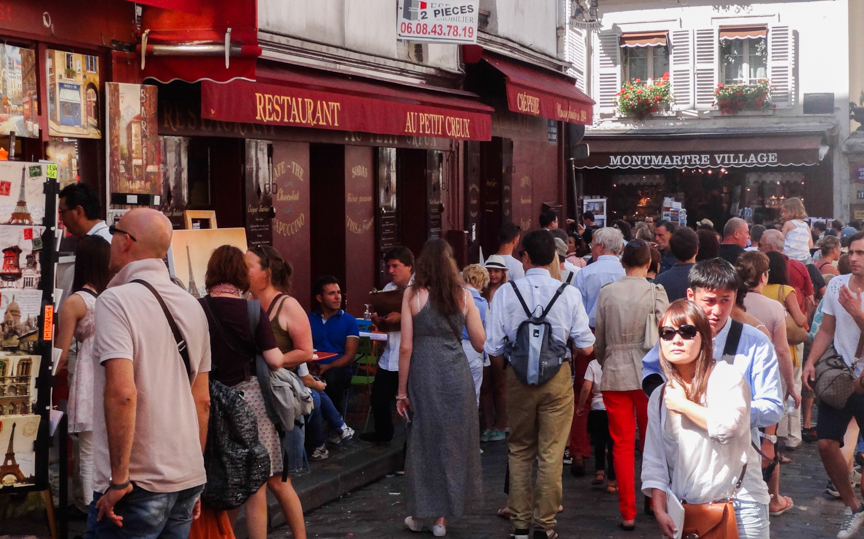
(Start of rant.)
I don’t understand this at all. Place Tertre and the small area around it are not unlike Disneyland: everything is phony and gussied-up and quaint and meant to accomplish one thing: extract money from tourists. And the tourists come in hordes. I can name ten neighborhoods in Paris that are more authentic and interesting than this part of Montmartre, but no one goes to them. Maybe it’s a good thing that all these tourists are here and not ruining other neighborhoods. But I can’t imagine why anyone would see this and think they’d seen Paris.
(End of rant.)
After our tour, we went a few blocks away from the scene above and introduced Brian and Jenn to a favorite Paris tradition: lunch at a sidewalk café. We had a wonderful meal, the weather was perfect and, well, you can see…

Further proof of my good friend Ken Disbrow’s observation that the well-traveled path isn’t very wide. We were no more that a ten-minute walk from the place where the picture above was taken. The restaurant clientele was French people, and us.
In an earlier post I commented on how Paris has opened up a long stretch of Seine riverfront, but I didn’t have any good pictures. Laurie and I walked this again a couple days ago and I got some better pictures. We love walking along the Seine, have always wished there were more places to do that, and so are very glad this has opened. We hear that plans are underway to open up more areas.

[gallery size= “large” link=”files” columns=”1” ids=”1435,1409,1408”]
St. Denis
Friday Laurie and I went to the Basilica of St. Denis, a twenty-minute metro ride north of Paris’ center. St. Denis is famous for two reasons: it is the first Gothic cathedral built; and all the French monarchs (and most of their queens) were buried here and darn near every one of them had an effigy carved for their tomb. So St. Denis is a lesson in architecture and a lesson in art history, as we see the effigies change from medieval rigidity to Renaissance beauty. (The kings and queens themselves are gone, thrown into a common grave during the French Revolution.)
In her fabulous book, “Paris to the Past,” Ina Caro writes about the revolution in architecture wrought by Abbot Suger, who built St. Denis in the mid-12th century. Before, the bishops and archbishops of France built and worshipped in Romanesque churches. Romanesque architecture is plain and low and powerful (and has its own beauty - Laurie and I love Romanesque and have made some long detours to see Romanesque buildings). Suger and his architects learned how to do away with the massive walls required by large Romanesque churches and replace them with weight-bearing ribs. That meant the space between the ribs could be anything, and Abbot Suget loved stained glass. So Suger put stained glass windows into his church, the first time that had been done.
Ina Caro describes the inauguration of St. Denis. Abbot Suger invited all the church higher-ups in France, they all arrived and, on the day of the inauguration, he escorted them into the Church. Remember, all these church authorities were from dioceses with low and squat and powerful Romanesque churches; here’s what they would have seen when Abbot Suger opened the doors to them:
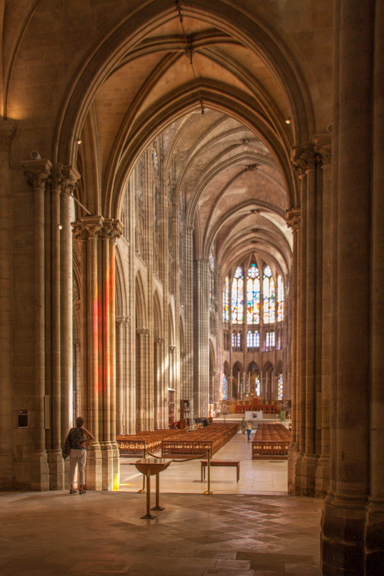
Caro points out that immediately after the inauguration, many churches around France had “accidental” fires, and were replaced by Gothic churches; the first replacements were built by the same architects and craftsmen that Suger used and Gothic architecture ruled for several hundred years. For example, Notre Dame, in Paris, had been started earlier as a Romanesque church; work was stopped and it was redesigned Gothic.
Anyway, seeing St. Denis was worth the trip out. I won’t say much about the effigies because, while they were interesting to a history nut like me (“Oh, look, there’s Francois 1st’s tomb! And there’s Henry IV’s! Oh, boy!”), I’m not sure it’s of interest to either of my faithful readers.
Friday night we went to dinner with Brian and Jenn, as the next day they were heading off to Berlin to see the Zumsteg contingent there (they’ll have a couple days in Paris before they return to Seattle), and we saw this at sunset:
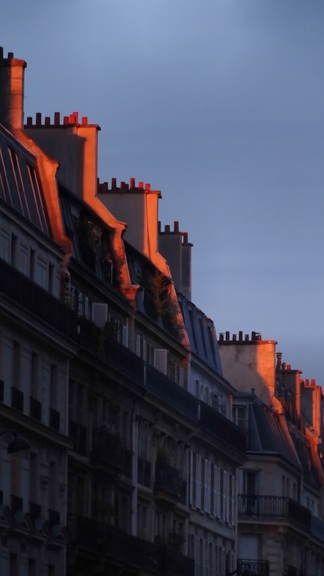
After dinner, which was eminently forgettable except for a delightful waiter, we walked around the islands. So, one last Paris picture: Brian and Jenn.
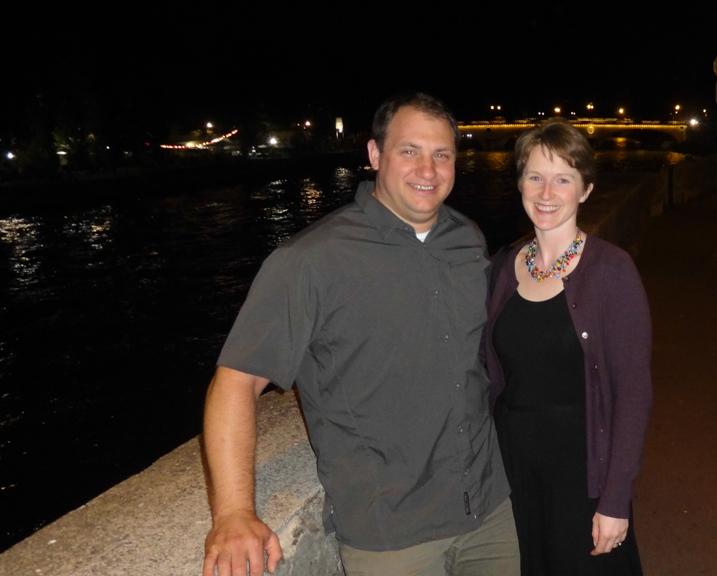
We really, really enjoyed having Brian and Jenn here and wished it could have been longer. We think they may have caught the travel bug and the Paris bug, so they’ll be back. Paris will still be here; we hope we are, too!